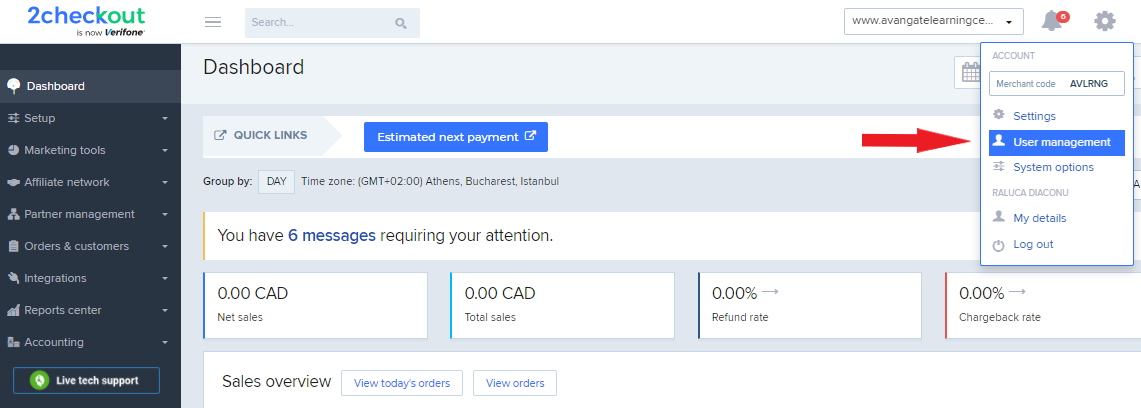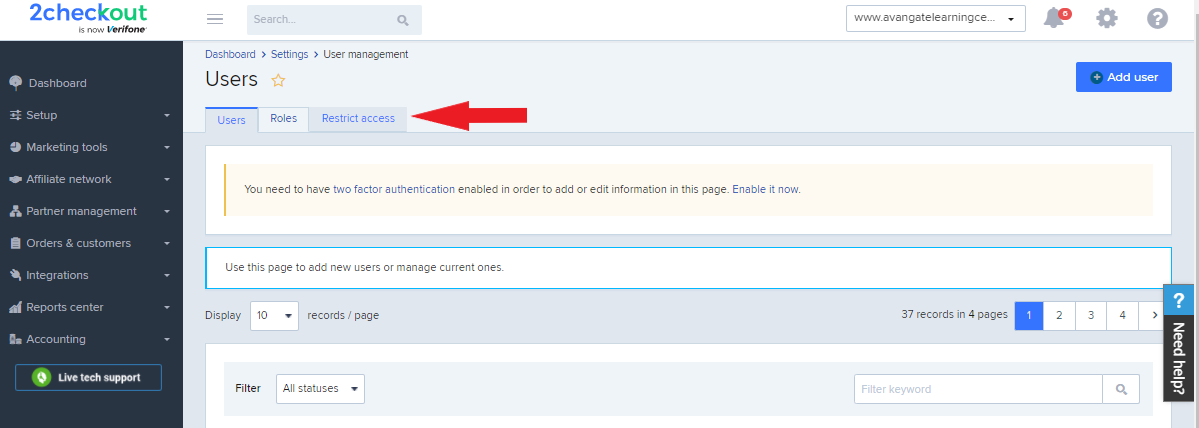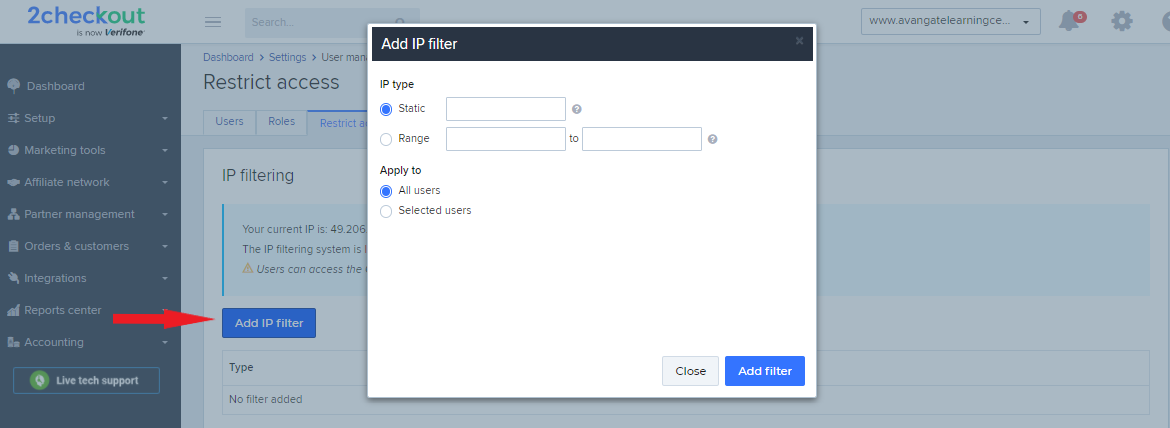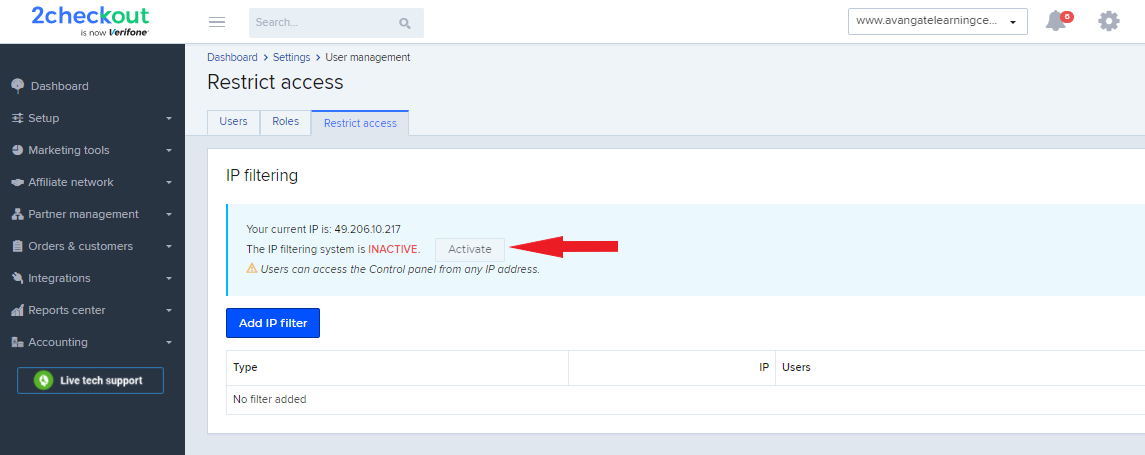Use Credit cards
Overview
Use the placeOrder method to create an order using products defined in your Control Panel and collect the payment using credit card based payment methods.
Parameters
| Parameters | Type/Description |
|---|---|
|
sessionID |
Required (string) |
|
|
Session identifier, the output of the Login method. Include sessionID into all your requests. Avangate throws an exception if the values are incorrect. The sessionID expires in 10 minutes. |
|
Order |
Required (Object) |
|
|
Object designed to collect all data necessary for an order, including billing, product/subscription plan and payment details. |
Requirements
For credit card orders placed using API 5.0, you need to pass through additional parameters that support the 3D Secure flow. 3D Secure works by redirecting customers to pages provided by their banks, where they need to enter additional security tokens or password to trigger the completion of the charge. By using 3D Secure, you get additional protection from liability for fraudulent card payments, with customers having to go through an extra layer of authentication. Send the following parameters in the placeOrder call:
| Parameters | Description |
|---|---|
| Vendor3DSReturnURL | Required (string) |
| URL address to which customers are redirected after the 3DS details get validated by the bank and the order is successfully authorized. | |
| Vendor3DSCancelURL | Required (string) |
| URL address to which customers are redirected if the 3DS details were not validated or the order could not be authorized. |
Response
| Parameters | Type/Description |
|---|---|
|
Order information |
Object |
| Object containing order information. |
Request
require ('PATH_TO_AUTH');
$Order = new stdClass();
$Order->RefNo = NULL;
$Order->Currency = 'usd';
$Order->Country = 'US';
$Order->Language = 'en';
$Order->CustomerIP = '91.220.121.21';
$Order->ExternalReference = NULL;
$Order->Source = NULL;
$Order->Affiliate = new stdClass();
$Order->Affiliate->AffiliateCode = 'Partner123'
$Order->Affiliate->AffiliateSource = 'MobilePlatform'
$Order->CustomerReference = NULL;
$Order->Items = array();
$Order->Items[0] = new stdClass();
$Order->Items[0]->Code = 'my_subscription_1';
$Order->Items[0]->Quantity = 1;
$Order->Items[0]->PriceOptions = NULL;
$Order->Items[0]->SKU = NULL;
$Order->Items[0]->Price = NULL;
$Order->Items[0]->CrossSell = NULL;
$Order->Items[0]->Trial = false;
$Order->Items[0]->AdditionalFields = NULL;
$Order->Items[0]->Promotion = NULL;
$Order->BillingDetails = new stdClass();
$Order->BillingDetails->FirstName = 'FirstName';
$Order->BillingDetails->LastName = 'LastName';
$Order->BillingDetails->CountryCode = 'us';
$Order->BillingDetails->State = 'California';
$Order->BillingDetails->City = 'LA';
$Order->BillingDetails->Address1 = 'Address example';
$Order->BillingDetails->Address2 = NULL;
$Order->BillingDetails->Zip = '90210';
$Order->BillingDetails->Email = 'customer@email.com';
$Order->BillingDetails->Phone = NULL;
$Order->BillingDetails->Company = NULL;
$Order->DeliveryDetails = NULL;
$Order->PaymentDetails = new stdClass ();
$Order->PaymentDetails->Type = 'CC';
$Order->PaymentDetails->Currency = 'usd';
$Order->PaymentDetails->PaymentMethod = new stdClass ();
$Order->PaymentDetails->CustomerIP = '10.10.10.10';
$Order->PaymentDetails->PaymentMethod->RecurringEnabled = true;
$Order->PaymentDetails->PaymentMethod->CardNumber = "4111111111111111";
$Order->PaymentDetails->PaymentMethod->CardType = 'visa';
$Order->PaymentDetails->PaymentMethod->ExpirationYear = '2019';
$Order->PaymentDetails->PaymentMethod->ExpirationMonth = '12';
$Order->PaymentDetails->PaymentMethod->CCID = '123';
$Order->PaymentDetails->PaymentMethod->HolderName = 'John';
$Order->PaymentDetails->PaymentMethod->CardNumberTime = 83.21; // can be null - high value in seconds is a red flag for fraud attempts.
$Order->PaymentDetails->PaymentMethod->HolderNameTime = 13.35; // can be null - high value in seconds is a red flag for fraud attempts.
$Order->PaymentDetails->PaymentMethod->Vendor3DSReturnURL = "http://www.success.ro";
$Order->PaymentDetails->PaymentMethod->Vendor3DSCancelURL = "http://www.error.ro";
$Order->AdditionalFields = NULL;
$Order->LocalTime = NULL;
$Order->GiftDetails = NULL;
try {
$newOrder = $client->placeOrder($sessionID, $Order);
}
catch (SoapFault $e) {
echo "newOrder: " . $e->getMessage();
exit;
}
var_dump("newOrder", $Order);




